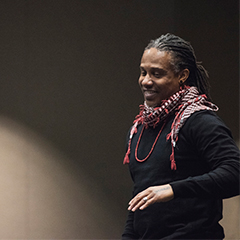Faculty Spotlight: Professor Dave Stovall
Conducted in Fall 2018, David Stovall discusses his book Born Out of Struggle: Critical Race Theory, School Creation, and the Politics of Interruption and how it connects to his work throughout the years. Stovall speaks about his current research on the relationship between school closings, public housing, and policing.
Image of Prof. David Stovall

“My engagement with CPS actually comes through more of a grassroots effort and that got me into a classroom.”
| Interview by: Maggie Cooper, Social Media and Outreach GA
Interview with Dave Stovall
How long have you been at UIC?
Dave Stovall: This is my 19th year.
In 2016, you published your book, Born Out of Struggle discussing school creation, critical race theory, and social justice. What led you to write the book?
Stovall: It was really around trying to document that process, so I knew a couple folks who actually went on a hunger strike. They called me about what they were trying to do in terms of demanding quality education and throughout that process I wanted and I knew there were a number of people documenting it from different perspectives. Then I wanted to document it from the perspective of someone being on the design team but also asking a question around which we understand that historical exploitative relationship that universities have had to communities. So the question I was asking was: what is the university’s responsibility to community-driven efforts? So that was kind of an overarching question and I had been doing work in critical race theory for the last two years before that. This was around asking that critical question of myself as a university professor, given that relationship and then what I do to integrate them.
Why is this topic meaningful to you?
Stovall: I think because we don’t have as many documentations of community-based struggle and the time after the initial struggle, some people think it’s an end, right? So when the hunger strike happened, folks got to school, people thought that was the victory. A part of the reason why that became important to me was that instead of thinking about the victory in a reframed lens is saying, well that’s just the start. So now what’s the work? What’s the work after that particular opening up of the gates? So now what do you do? I’m given that work afterward.
How has this informed any of your current research? What is your current research project?
Stovall: Over the last 25 years, I’ve been looking at this relationship between race and place in school and when our struggle was one of those manifestations. Now I’m looking at the relationship between school closings, construction of public housing, and law enforcement strategies here in Chicago. So my argument is that instead of thinking about hyper-violent youth or this propensity to violence, really thinking about how conflicts can be engineered between groups. If we think about an engineering of conflict that changes up how we approach these things.
What is your relationship to Chicago Public Schools and student/teacher in Chicago? How has this informed your own teaching at UIC?
Stovall: I have been working with folks in CPS for the last 25 years. As a member of the design team for the high school, which is a neighborhood public school, I also taught a class for 13 years. So this thing around the ways in which I interact with young folks and families becomes important to me because I don’t have a traditional educational background. So I didn’t go through a teacher training program. My engagement with CPS actually comes through more of a grassroots efforts and that got me into a classroom. I actually got to a classroom by working with one of my former undergraduate students. So that set of relationships deeply informed how I engage with students here at UIC because I feel like both spaces inform each other. So you think about the high school space and the college space at the undergraduate and graduate level, there are these things that sometimes people are quick to theorize and kind of dismiss them. But high school folks, the folks that I worked with the most, they’re the group that reminds you of the importance of keeping your work grounded and in tune with how they are understanding the world.
What classes are you teaching next semester?
Stovall: Next semester I am teaching two courses. Race, Place, and School: African Americans in Education. Then I have a class in criminology: Youth, Crime, Justice, and the Law.
What is something students can expect to learn in your courses?
Stovall: I think one of the main focuses is around reframing the current views and understandings around young people. I think centering the ways that young folks see themselves in the world, but also are viewed by the world because a lot of times people are dismissive around young folks. The idea is what if we pay attention to those thoughts in a different way? There’s a couple of things that happen and when we pay attention to young folks, the question now we have to ask internally is how does that change our approach when working with them? I think that’s a big thing for me in terms of reconceptualizing how we understand folks.
What would you say to a student who was thinking about majoring in African American studies?
Stovall: I would say it’s a place to get clear on the ways in which black life is impacted by the world. So I think if someone is interested in that then African American Studies would definitely be a space for them.